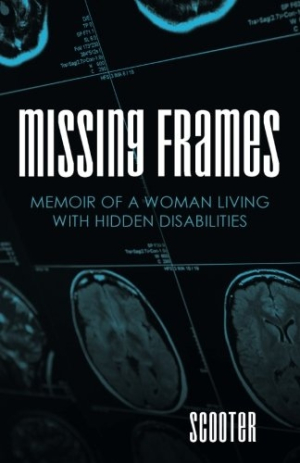Missing Frames
Memoir of a Woman Living with Hidden Disabilities
Missing Frames offers compelling insights for survivors of traumatic brain injury and their friends and family.
Missing Frames: Memoir of a Woman Living with Hidden Disabilities, by Scooter, offers an insider’s view of the not-much-understood world of traumatic brain injury.
The author has suffered two traumatic brain injuries: one in a car accident as a young adult and the other during a fall three decades later. She began writing the book after the second injury as a way to find healing, make sense of her experience, and move forward. While she speaks exclusively to her own experience, her life gives insights for others with traumatic brain injuries and their families and friends.
Through her narrative, Scooter details her medical and mental treatment and recovery, including insights and procedures from an array of medical doctors, psychologists, and other practitioners. But her approach in the book is much more holistic than simply medical—traumatic brain injury is a whole-life issue. She delves into legal battles and spiritual exploration, including attending the filming of an episode of Oprah’s Lifeclass and reading the Bible. The most stirring passages, and those most likely to enlighten the loved ones of others with traumatic brain injury, are those where Scooter shows the aspects of the affliction that have an impact on relationships: volatility, vulnerability, and persevering hope. These scenes bring to the forefront the disabilities and complications that often go unnoticed—and can fester into broken relationships and added psychological trauma.
The title refers to Scooter’s memory loss and ongoing memory difficulties, a source of pain, confusion, and intense frustration for her and those around her. The phrase “missing frames” captures the memory loss perfectly and highlights the author’s search for overarching meaning and wholeness—themes that will resonate with all kinds of people who are recovering from traumas, large and small.
What’s most compelling in the story is Scooter’s relentless pursuit of hope. She fights off despair every step of the way, always persisting, always seeking fulfillment and answers. This narrative pulse of hope keeps the story engaging, evoking empathy and stirring a sense of determination.
Scooter is generous and open with the pain and healing she’s experienced, which is inspiring for others who feel trapped and isolated by trauma. The tone is warm, friendly, and intensely personal. As a result, the writing is at times casual and the pace slows and speeds, but the book is easy and quick to read. It feels like listening to a friend discuss intimate details of the biggest challenges of their life. While Scooter’s memory loss made the writing process difficult, she’s managed to overcome and produce a fairly cohesive, complete account.
Missing Frames offers compelling insights for survivors of traumatic brain injury and their friends and family.
Reviewed by
Melissa Wuske
Disclosure: This article is not an endorsement, but a review. The publisher of this book provided free copies of the book and paid a small fee to have their book reviewed by a professional reviewer. Foreword Reviews and Clarion Reviews make no guarantee that the publisher will receive a positive review. Foreword Magazine, Inc. is disclosing this in accordance with the Federal Trade Commission’s 16 CFR, Part 255.

